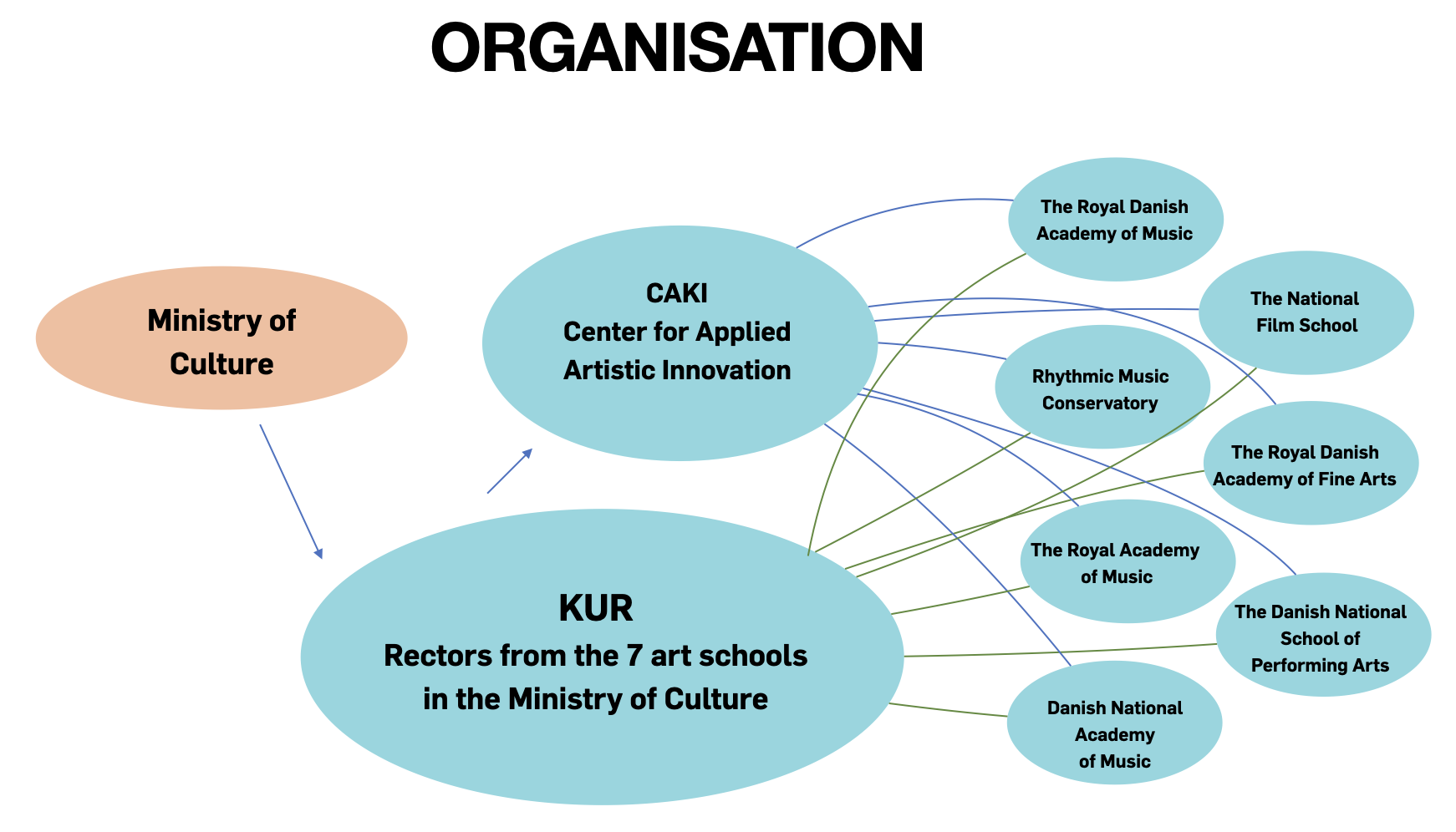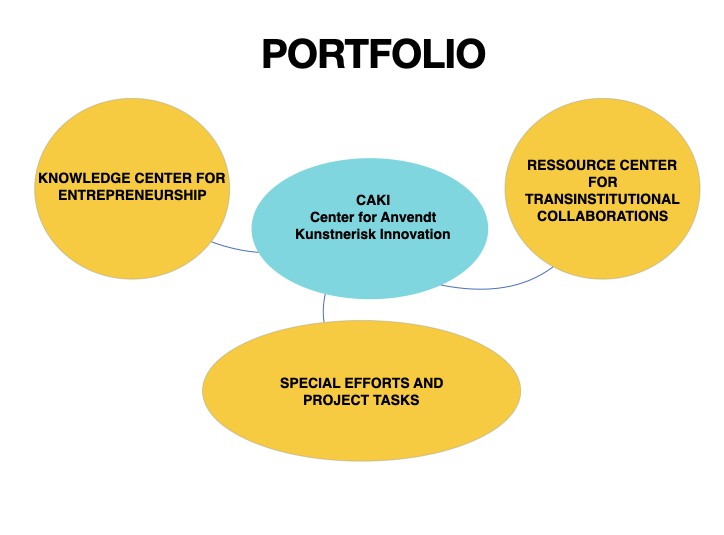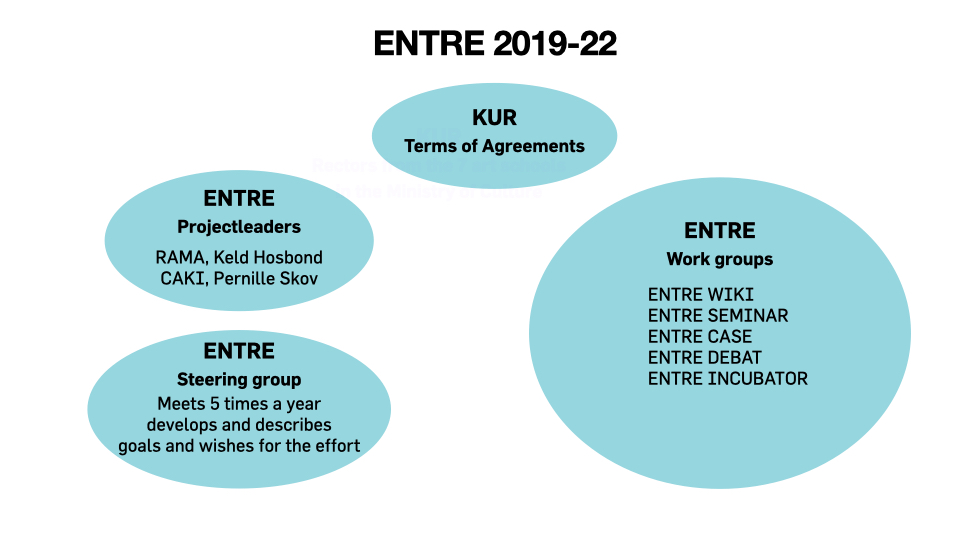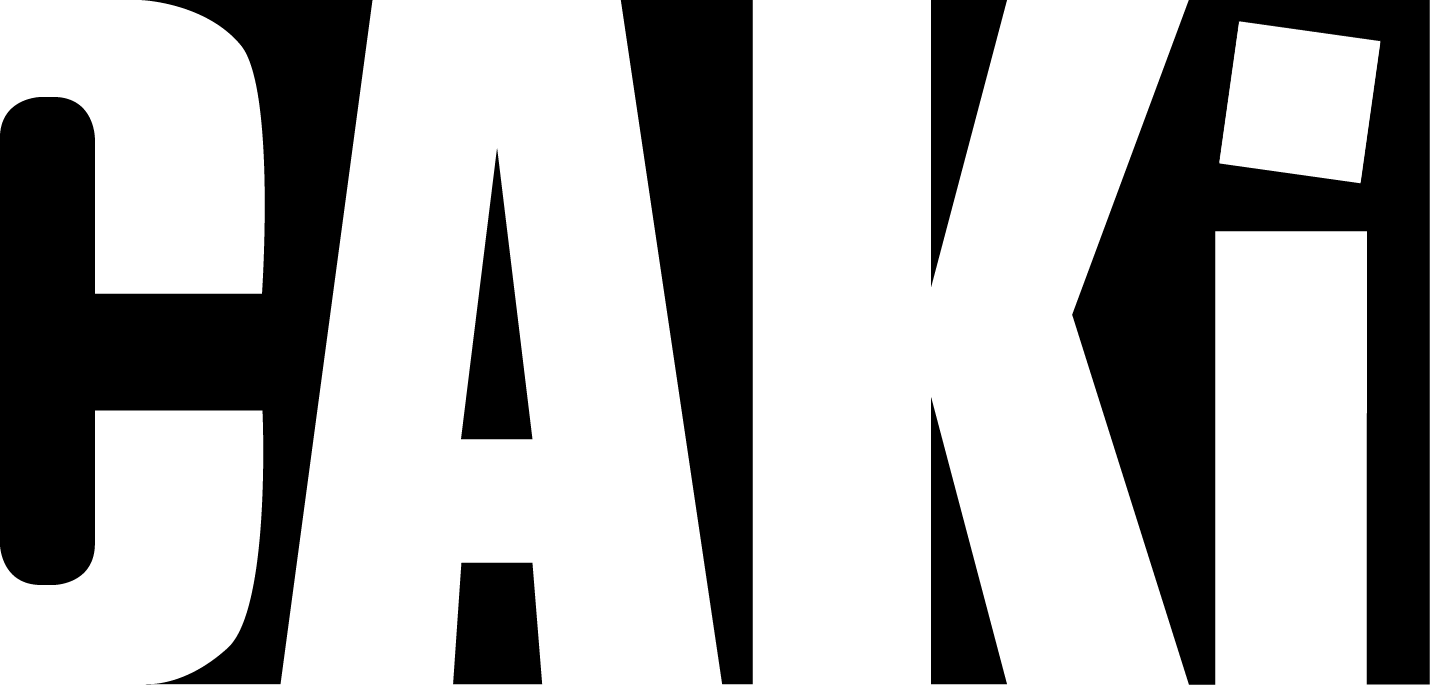About CAKI – Centre for Applied Artistic Innovation
CAKI – Center for Applied Artistic Innovation is a knowledge center for personal and artistic entrepreneurship and innovation. CAKI works to strengthen knowledge and skills that support sustainable working lives through personal and artistic entrepreneurship and innovation. CAKI works to develop the level of knowledge and quality for entrepreneurship and entrepreneurship education in higher education as well as in professional environments, with a focus on personal entrepreneurship.
In the period 2011 to 2024, CAKI was the joint center for the seven higher arts educations under the Ministry of Culture. In the spring of 2024, CAKI was constituted as an independent centre, run by CAKI’s co-founder and long-time leader Pernille Skov.
From 2011 to 2023, CAKI was knowledge center for artistic entrepreneurship at the seven institutions. The center worked to strengthen knowledge and competencies that support sustainable careers through artistic entrepreneurship and innovation. CAKI collaborated with the educational institutions to ensure that each program develops and offers entrepreneurship education at a high level, aiming to best support the development of artistic and economically sustainable careers.


CAKI handles the project management for the steering group for entrepreneurship and the associated working groups. The effort is described under the title ENTRE.

KNOWLEDGE CENTRE OF ENTREPRENEURSHIP
KNOWLEDGE CENTER FOR ENTREPRENEURSHIP
Objective: To carry out the task as a knowledge center for entrepreneurship with updated knowledge within the area and ensure that this knowledge flows to the institutions in the KUR circle.
CAKI as a resource in education:
- Support the institutional anchoring and development of entrepreneurship as a field of knowledge at all levels of education.
- Contribute to the development, qualification and evaluation of learning goals and educational formats, as well as qualification and competence goals for artistic entrepreneurship and innovation.
- Assist schools in recruiting teachers of artistic entrepreneurship and innovation.
- Advice in connection with the appointment of censors for entrepreneurship and innovation subjects.
- Operate and update the online platform with learning material for students and teachers within the knowledge center’s areas of competence.
- Operate and update online platform entrenord.dk. The platform supports the international perspective on knowledge sharing, networking and partnership building between higher artistic educations internationally in the field of entrepreneurship.
At CAKI, we work with entrepreneurship with the aim of strengthening students ‘and graduates’ artistic activity and entrepreneurship based on the individual’s professionalism as the central element in the financially sustainable company.
We work with entrepreneurship in a number of areas:
- Competence development of teachers
- Preparation of learning materials for students and teachers
- Co-curricular activities across the artistic educations
- As a dissemination platform for the latest knowledge about entrepreneurship
The majority of the graduates from artistic educations go into professional work as self-employed when they graduate from one of the art schools. As a self-employed artist, it is central that you build a working life that is sustainable professionally as well as financially. In addition to a high level of professionalism, it therefore also presupposes that you know options for choosing a company form, financing, pricing, sales, negotiation, tax and VAT, etc. It also presupposes that you are enterprising and have a well-developed understanding of the world around you.
On behalf of KUR, CAKI works in the Agreement period 2019-2022 with entrepreneurship in the art educations with a focus on the competence development of teachers as well as with the strategic and practical construction of an incubation environment for students and researchers. As part of this movement, CAKI has established a network for the entrepreneurship managers at the programs. The network forms the core of a working group whose aim is to open the doors to entrepreneurship as a field of knowledge and competence for teaching colleagues and show what the subject of entrepreneurship can do as practice and as pedagogy.
In addition, CAKI collects, processes and disseminates knowledge and experiences about teaching, examination methods and evaluation of entrepreneurship education at the higher artistic educations as well as from our national and international network via the website and newsletters.
Until September 2019, students through CAKI have been able to participate in workshops and courses on, among other things like start-up, financing and fundraising. In addition, CAKI has offered both individual and group-oriented coaching, career counselling and start-up counselling. It is an objective on the part of KUR that these needs will in future be covered locally at the schools, and that CAKI in the period up to 2022 will primarily focus on competence development of the teachers as well as the development of an incubation environment for students and researchers.
In addition to consulting, courses and workshops, CAKI has published a number of publications that provide guidance in various aspects of entrepreneurship. The materials are available on the website. You can read more about CAKI’s previous courses and workshops in the course overview elsewhere on the website.
Artistic and cultural entrepreneurship in the artistic enterprise
The conditions of the artistic practice and the creative processes that underlie it are challenged by the speed with which society, the world and technologies are evolving. Not least in the form of the movements of technological innovations, changed distribution options and formats for presentation. Educational institutions must be able to train the artists of the future to meet these challenges and expectations, and it is part of the education’s task to equip the individual student to be able to participate in this reality.
The artist’s company, therefore, requires, in addition to the artistic point of view, also entrepreneurial skills and management skills that can support and lift the artistic company. Similarly, entrepreneurship can contribute to strengthening the application and development of core professionalism in relation to the individual artist’s company as well as in relation to the outside world.
Against this background, a project is initiated that aims to develop and strengthen the relationship between entrepreneurship as a field of knowledge and artistic practice. Integrated into the project is a focus on systematizing the knowledge sharing of the project’s experiences, so that teachers, students and education developers in all the artistic educations have access to the latest experiences and the knowledge gained so that the project can help strengthen the usability of the field in the educations’ everyday practice. It is expected that in the long term and based on the new knowledge they acquire through the project, the teachers will locally develop pedagogical and didactic initiatives that strengthen the students’ entrepreneurship and competencies within artistic activity and cultural entrepreneurship.
With the project, the intention is that the working group for entrepreneurship opens the doors for entrepreneurship as a field of knowledge and competence for students and teachers and shows what the entrepreneurship subject can do as practice and as pedagogy. The project is initiated by CAKI / Pernille Skov with the participants in the working group for entrepreneurship in the artistic educations as partners and in collaboration with teachers in the KUV network.
Artistic innovation
CAKI defines artistic innovation as artistic activities and processes that create new knowledge in the form of new methods and/or new products. By utilizing this new knowledge, through a combination of knowledge and the realization of opportunities, a real added value is generated. With artistic innovation, a qualified translation of new knowledge thus arises, which can be applied within a larger context. Be it artistically, technologically or socially. The work with artistic innovation contributes to new dimensions for the artistic field of work and activity.
CAKI has identified three focus areas within artistic innovation: Education, society and public and private collaborations.
Education
In the context of artistic innovation, CAKI will examine the artist’s role as a carrier, creator and communicator of knowledge. The focus is on both students and teachers. It is CAKI’s ambition to link artistic innovation more closely to teaching practice and artistic development activities. Artistic innovation is understood here as the innovation generated in the relationship between people or in communities of practice. CAKI points out that the work with artistic innovation can strengthen the entrepreneurial and innovative commitment to artistic education, as the existing practice is challenged and developed.
Private and public collaborations
CAKI wants to make visible the artist’s ability to create space for development in existing structures and processes. The artist’s approach is most often development-oriented and dialogical. In the context of private and public collaborations, artistic innovation can thus be a resource with the opportunity for strong value and growth generation for both parties. Therefore, CAKI sees potential for innovation in the artist’s encounter with modern organizations.
Community
Artistic innovation marks a distinctive artistic value. CAKI will help to highlight the role of the artist and the potential of the artistic method, experience and approach in relation to strengthening the innovative power of society. The artist’s ability to work with and thematize complex challenges, accept and examine ambiguity, values and conflict material, gives artistic innovation a significant position as a catalyst in societal change processes. This applies at both individual and collective levels in relation to socio-economic, technological and cultural development. For more knowledge about entrepreneurship in the artistic field, you can read CAKI’s Note about entrepreneurship in the higher artistic and cultural educations. Here we put into words what is special about entrepreneurship for art students and graduates.
Background
More and more studies from Denmark, as well as from an international level, confirm the need for an effort in the development of more contractors. The new self-employed help to strengthen the country’s ability to develop, produce and market new goods and services – cultural and social as well as economic and technological. It is important for the employment of graduates from artistic educations, but it is at least as important for Denmark that we educate enterprising creative and performing artists and producers who manage to see their own creativity in a societal context.
Therefore, CAKI continuously focuses on building experience with and clarifying what value and influence the art and the artist create with and for the surrounding society. At CAKI, we work with how entrepreneurship can contribute to strengthening the artistic area in society.
______________________________________________________________________________________________
READ MORE
ENTRE 2019-22
EntreNord entrepreneurship in Arts Education in the Nordic Region
Entrepreneurship at the conservatories in Copenhagen
CAKI Handbooks
Mentorship
RESOURCES FOR INTERDISCIPLINARITY
Objective: To assist the educational programs in developing, realizing, and anchoring interdisciplinary collaborations.
The purpose is to support that the educational programs always have access to knowledge and networks to actualize cross-disciplinary teaching programs and other educational activities across the artistic education programs.
This includes sharing the TVAERS catalog, the common catalog of courses for students from all higher artistic education programs, on caki.dk. Similarly, materials from the art schools’ joint effort to strengthen internationalization, INTERART, are available via caki.dk.
READ MORE
Cross-institutional activities
SUPPERTED STUDENT PROJECTS
See the projects’ which have been approved and supported by CAKI
Interdisciplinary work is a natural part of the reality that the majority of graduates from artistic educations encounter as professionals. Building competencies that enable a well-functioning collaboration across the arts, sectors and knowledge areas is, therefore, an important part of the artistic practice.
Interdisciplinary work is a natural part of the reality you encounter as a professional in the artistic disciplines. Competences to be able to act professionally in an interdisciplinary field of work are similarly an important component in innovative processes and artistic professionalisation in general. At CAKI, three types of interdisciplinary collaborations are explored: the inter-aesthetic, the inter-artistic and the interdisciplinary. In all three situations, artistic and creative competencies are important tools for new thinking and innovation and therefore also have the potential to reach beyond the cultural sector and gain relevance in e.g. social and occupational contexts.
At CAKI, we probe between three types of interdisciplinary collaboration: the interdisciplinary, the inter-artistic and the inter-aesthetic. We work with the following general definitions for the three types of collaboration:
Interdisciplinary collaboration
Interdisciplinary collaboration takes place from different professional points of view. Often there will be a focus on sharing or developing knowledge, innovations, experiences and observations across professional boundaries. The purpose of the interdisciplinary collaboration can be to investigate a specific working method, such as. improvisation or repetition, or it could be that a philosophical or political concept is discussed from different (artistic) professional points of view. These are different perspectives on a common topic, where you contribute with your specific professionalism in a collaboration that does not necessarily have a common work or production as a goal. You stay within the framework of your professionalism, and absorb any new knowledge within this framework, just as you can send knowledge from your professionalism to other disciplines.
The inter-artistic collaboration
The inter-artistic collaboration will often have the production of a work or product as its goal. Interdisciplinary teaching can e.g. be the collaboration between the Rhythmic Music Conservatory and the Danish National School of Performing Arts, where the students will make a ‘Performative concert’. There is a focus on how the two art disciplines can work together with the theatre concert as a genre, but without them moving beyond their respective disciplines.
The inter-aesthetic collaboration
In the inter-aesthetic collaboration, the professional boundaries are more porous, to a greater or lesser degree. There may be a work or a production at the end of the course, but in the inter-aesthetic collaboration, it will rarely be possible to say what the final result will be, just as a possible work format will not be known in advance. Often the starting point for the inter-aesthetic collaboration will be a question or a task that is sought to be dealt with through an artistic process. In that case, the work will be the means, while the process itself and the method are the goals of the collaboration. In many cases, the inter-aesthetic collaboration will have the character of artistic development work or company. In other words, a form of the artistic research study.
SPECIAL EFFORTS AND PROJECTS
CAKI also serves as a resource for other initiatives and projects when circumstances allow.
The center has, among other things, carried out:
- A mapping of the culture of evaluation and avenues for complaints at the seven institutions following the political agreement on strengthening the artistic education programs under the Ministry of Culture on December 22, 2021.
- TVAERS: a qualitative investigation of the need for cross-disciplinary educational offerings in both the professional environments and among students at the seven institutions, following the work of the KUR working group on cross-disciplinary educational offerings.
- ENTRE: project management of an extensive cross-institutional effort to strengthen entrepreneurship as a field of knowledge aimed at educators at the seven institutions.
- Arts Education and Cultural Life of the Future: A conference jointly hosted by the seven institutions.
- A mapping of the institutions’ needs for the development of the entrepreneurship area following the common goals of the schools in the framework agreements for 2019-22.
For more information, you can refer to CAKI Publications and CAKI Activities.
STRATEGY
CAKI strategy 2019-2020 (in Danish)
CAKI development plan 2010 (in Danish)
ANNUAL LETTERS
Note that the annual letters are in Danish
ACTIVITIES
SUPPORTED PROJECTS
See the projects that have received funding from CAKI
CONTACT
Phone: 41 88 25 88
E-mail: caki@caki.dk
ENTREPRENEURSHIP IN THE ARTS EDUCATIONS
Entrepreneurship activities in the art schools in the period 2011 – 2016 (in Danish) her
Entrepreneurship in the curricula of the art schools 2019/2020 – download (in Danish) her
MAPPING OF LOCAL
In the autumn of 2019, CAKI did a mapping of the institution specific needs and wishes in relation to the further development of entrepreneurial competencies. The report is part of the knowledge base for the development of a program for competence development in entrepreneurship (in Danish). Download the report here.
